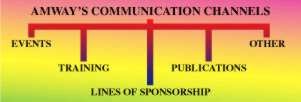Direct selling
Amway was set up in 1959, with only a disused service station as a base. Today, Amway is one of the world’s largest direct sales companies, with over 2.5 million independent distributors in more than 70 countries world-wide. There are 35,000 independent distributorships in the UK, Republic of Ireland and Channel Islands offering a range of products from a vast product portfolio.
The critical relationship between Amway and the seller or distributor is at the heart of Amway’s successful approach to direct selling.In direct selling, the sale is the culmination of many marketing activities which involve matching customer requirements to the goods or services offered. The main benefit of this form of selling is that it allows distributors to focus on individual customers and their needs.
The starting point for any kind of direct selling activity is the preparation. Anybody involved in direct selling should be fully trained and familiar with all aspects of the product and customer needs. It is important to remember that consumers have many choices in the market-place and are better informed than ever of these choices. Preparation is therefore increasingly important for Amway’s distributors.
Although it has been said that sales people are born and not made, the development of skills and knowledge is essential for good sales performance. Product knowledge, in particular, is vital – so that the seller can present a product’s benefits and functions comprehensively and answer any questions the consumer may have.
The importance of communication
Clear communication is essential when managing activities. Amway needs to communicate regularly with its 35,000 distributors in order to help them prepare for their increasingly challenging role. Communication is the passing on of ideas and information. In business, it is essential to have good clear channels of communication.
This case study focuses on how Amway uses a range of communication methods and processes to help individual distributors develop their own business opportunities.
There are many possible objectives and benefits from a close and well developed communication system. Communication is only successful when the intended result is achieved. This effectiveness is dependent on the choice of recipient, the clarity of the message and the choice of communication medium.
It would be inefficient and wasteful to send a message to every distributor regarding every single issue, particularly if some issues only concerned a few individuals. Similarly, members of an organisation should not be overburdened with communications. If there are too many messages, distributors may simply stop reading them. This could mean that they may miss the most important messages! Effective communication at Amway, therefore, involves making prior decisions about who needs to receive the message.
Sometimes it is necessary to repeat a message. For example, in the classroom, a lecturer will attempt to explain a task in clear and simple terms, but if students are unsure about the message, he will rephrase it until the students understand. Repeating messages through a different communication channel can also aid the target market’s understanding.
Messages to Amway’s distributors should, therefore, be as clear and direct as possible, limiting areas in which misinterpretation could arise. A good understanding of the audience using terms and language they are familiar with is vital.
Choosing the communication channel

The choice of communication channel used by Amway depends on what needs to be communicated. The way in which a message is delivered has an important impact upon how it is received. For example, certain publications, specifically targeted at top distributors are used when Amway wishes to communicate very specialised information, of value only to this level.
Amway´s communication channels

There are five different communication channels.
Corporate Events
Corporate events include specially arranged functions, such as product fairs, conferences and seminars, which distributors at different levels are invited to attend. Face-to-face communication at a range of events helps Amway and its distributors to get to know each other. They also provide an opportunity for distributors to get to know each other and are useful for relaying messages, giving advice and generating personal discussion.
Events include:
- Pace Setter – a reward incentive to help new and existing distributors reach the 6bonus level within three consecutive calendar months.It also encourages a balanced business, with equal amounts of retailing and sponsoring – essential for long-term success and profitability.
- Direct Distributor Seminar – allows newly qualified Direct Distributors to meet the Amway Management Team, tour the UK Headquarters, attend key informative, motivational business sessions and go to the New Direct Distributor Gala Dinner.
- Leadership Seminar – where distributor leaders who have achieved a target criteria set by Amway, travel for a seven day trip with compliments of Amway to some of the world’s finest beach locations and hotels where they attend a number of business sessions and exchange thoughts and ideas with corporate staff.
- Launch into ’98 – a major annual launch of new products and services presented by a road show of events.
Participation at these events enables distributors to contribute ideas and solutions to problems encountered. The relationship between Amway and its distributors can, therefore, take place in an atmosphere of mutual trust and respect.
Training
Training builds the skills and knowledge of distributors and therefore improves competence levels. For Amway, the starting point of the training process is to identify the skills and knowledge necessary for distributors to carry out their role.
Acquiring product knowledge is an important aspect of training and preparation. As Amway relies upon the personal service of its distributors and the quality of its products, it is essential that distributors are not just shown how to use products but also how to merchandise them to their best advantage.
Training may involve either Corporate or Group (Line of Sponsorship) Training on specific product brands. Distributor input into these sessions provides informative help for the management of independent businesses. Once a distributor has achieved an advanced knowledge of a specific brand, they can then receive the training and tools required via a ‘Train a Trainer’ session whereby they will be taught how to train their own group, therefore maximising their expertise.
Lines of sponsorship
Amway is essentially a people-based business – without people, the business cannot expand. The business of each distributor grows via new customers and through the sponsorship of new distributors.
Established distributors are involved in helping newly sponsored associates to merchandise Amway products. Distributor groups meet to discuss company procedures and their goals. The groups also discuss new product launches and promotions, the administration of their businesses and support new and existing distributors. These lines of sponsorship provide constant, face-to-face support from professional associates.
Publications
Written communication is useful as a permanent source of reference. Amway uses a range of written communications. These include:
- Anagram – This magazine is mailed directly to all Amway distributors in the UK, the Republic of Ireland and the Channel Islands. Anagram is used to communicate information about new products, promotions, community news, distributor events and recognitions as well as news of other affiliates throughout the Amway world. Anagram shows how distributors can make more out of their business. It is also used to help distributors understand the philosophy by which the business operates and the legislation regulating the Direct Selling Industry. For example, The Trading Schemes Act 1997, widens controls over illegal ‘pyramid selling’ and provides basic standards of business practice for participants in legal Trading Schemes.
- Diamond & Leaders’ News – This is used to communicate special information to leading distributors. It may involve providing them with information which they need to pass down to other distributors or it could provide top distributors with ‘elite’ information such as the previews of launches or any changes in policy which only applies to this group, at a particular time.
- Newsgram and WAD (Warehouse Authorised Distributor) Bulletin – Newsgram is sent from Amway to Direct Distributors. Although its purpose is similar to Diamond News, information is communicated in a format more suited to the target audience.
- Special Literature – Occasionally, Amway designs a brochure or leaflet which is used to address a particular change or launch, e.g. new car care product range.
Other communication channels
The circumstances under which a business communicates constantly change. Organisations have to constantly review their communication systems to ensure the correct messages are transmitted in the correct way to the required audiences.
For Amway, this means that different communication media are required for a range of purposes. For example:
- Direct distributors are targeted via a monthly mail-out
- Packing slips have short messages printed on them
- A telephone team at the Amway Information Centre handles ongoing enquiries
- Amway has recently launched their first ever brand advertising campaign. In an ever-competitive market-place, it has been used to raise brand awareness.
Perhaps the most rapidly developing global communication forum is the Internet. For a company like Amway, with distributors all over the world, the potential of the Internet, as a communication mechanism, is enormous.

The Internet serves as an important information source and offers the Amway Corporation a platform to define ‘Amway,’ its opportunities, products and association. The Amway (UK) Limited web-site is interesting and informative, containing many different facts about the Amway Business in the UK, Republic of Ireland and Channel Islands. Pages in the Amway (UK) Limited web-site refer to:
- What is Amway (UK) Limited?
- Amway (UK) & the Community
- The Amway (UK) Product Range
- The Amway (UK) Business Opportunity
- Amway (UK) News.
Artistry products
Developing a new range of skin care and cosmetics products is a costly process. It is important to co-develop the distribution network, thus giving key advantages over other products in the market-place.
Amway created ARTISTRY* as a complete line of skin care and cosmetics, to make clients look and feel the best that they possibly can. Amway is one of the few cosmetics companies in the world with its own manufacturing plant, so the Company can retain control over quality and follow hygiene guidelines which are stricter than those required by the law.
No product is launched until is has been rigorously tested – before, during and after manufacturing processes, Amway does not test on animals. Amway has also invested heavily in the development of the packaging of the ARTISTRY line.
The packaging features a signature gold band alongside the ARTISTRY diamond logo. Consequently, ARTISTRY products rival those sold in department stores, but with the added bonus that ARTISTRY products are sold with personalised, expert service – distributors can be trained to become ARTISTRY Consultants.

To become ARTISTRY Consultants, distributors attend a training course which covers:
- Learning about the skin
- Skincare products
- Cosmetic application – basic techniques
- Cosmetic products – application, co-ordination and advanced techniques
- Merchandising session – how to build an ARTISTRY business.
The aim of this course is to allow distributors to develop their product knowledge so that they can deal professionally and confidently with customers.
At the course, Amway distributors are provided with a training manual. The ARTISTRY Learning Guide is the central part of a larger training and personal development programme known as the Amway Performance Learning System (APLS).
APLS provides information about ARTISTRY products so that distributors can become successful and knowledgeable ARTISTRY Consultants. Also included with the ARTISTRY APLS is a video which co-ordinates with the Learning Guide.
Whilst training to become Beauty Consultants, Amway distributors can also use other usual communication channels to further develop and improve their product knowledge and obtain key information, such as product updates.
Clarifying business opportunities

Acceptable business procedures must be developed when a large number of distributors representing a single organisation, all work independently. It is important that communications from Amway provide a moral direction for its distributors but, at the same time, allows them to develop their own identity.
The Amway Rules of Conduct and Code of Ethics conform to the DTI’s requirements and define the rights, duties and responsibilities of Amway distributors. Other communications are also designed to reaffirm acceptable moral principles.
The manner in which a salesperson deals with an ethical issue can have far reaching consequences not just on that individual but also upon the organisation as a whole. For example, distributors must not mislead customers on the claims of a product in order to achieve a sale.
Direct selling is about person-to-person marketing where the salesperson must have credibility and trust. The processes of communication at Amway are designed to help distributors become well trained and professional in all their dealings.
* Trademark, Amway Corp. MI, Ada, USA



